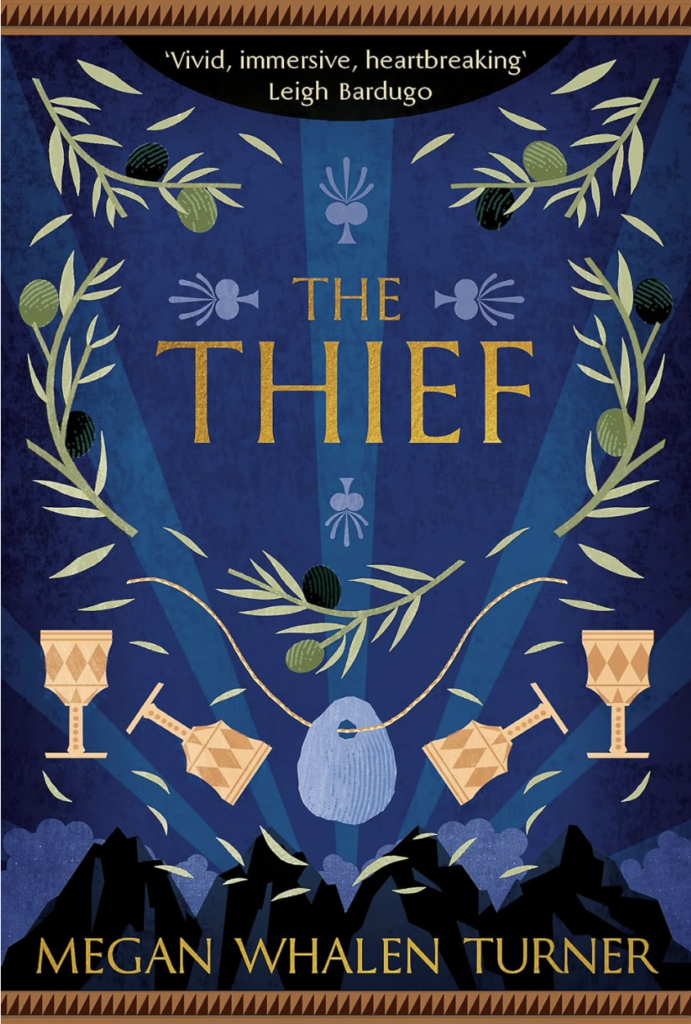The 1997 runner-up for the Newbery Award was an unusual and subtly complex novel about political intrigue, geopolitics, mythology, and human endeavor. Commended by the American Library Association for its “subtly placed clues and artful misdirection,” it culminates in “a stunningly clever climactic twist.” The Thief by Megan Whalen Turner is interesting and well-told. And, one that I have returned to many times in the last half dozen years.

In a region of the world that feels very much like the Mediterranean, three small (fictional) countries exist in a precarious state of co-dependence. Each needs the other, each seeks to gain the upper hand over one of the others (usually through alliances with the third), but all three must ultimately stand together against the outside forces that will come sooner or later. The country of Sounis has a childless king, the country of Eddis has a kind and unmarried young queen, and the country of Attolia has a cold, young, and beautiful queen. No one wants to marry Attolia, and Attolia has her own agenda to attend to. Sounis wants to marry Eddis to gobble her small lands but mostly because of her valuable mountain passes. Eddis has no interest in marrying the scoundrel Sounis. And so, since each is locked in a stalemate, Sounis seeks to find another way to claim the throne of Eddis.
For hundreds of generations, the ruler of Eddis has been chosen by the gods. Tradition teaches that the gods imbued a stone with spiritual power to confer royal authority on the holder. In each generation, the leader of Eddis has employed a royal thief to steal any number of items. But, most significantly, each leader must first have their thief steal the stone, Hamiathes’s Gift. Only a thief beloved by the gods Eugendies and Moira can successfully find and steal the Gift. And so, Sounis decides that he will find such a Thief and have him steal the Gift and award it to Sounis thus forcing the two kingdoms to unite.
The story starts with Gen (short for Eugendies) languishing in a prison in Sounis. Within a matter of pages, the adventure has begun. The king’s magus (advisor) releases Gen into his custody in the middle of the night so they, and a small contingent of apprentices and a soldier, can sneak into Attolia where the magus believes the Gift is hidden. Gen is surly, indolent, and crafty. Completely unlikable. The magus is rude, impatient, and condescending. Also unlikable. But, as we learn in the end, all of this is theatre of a sort. Each is pretending to be something other than what they are. And both are actually quite likable in the end.
The story is exciting, creative, and intellectually satisfying. Every time I read it, I cannot help but feel like I am re-entering C. S. Lewis’s Till We Have Faces as the relationship with the gods, the Mediterranean feel, and the political aspects with female queens are also similar. I enjoy this book immensely each time I read it. And, in fact, this book improves with each re–read. It is rich and deep.
Parents May Wish To Know . . .
There are two separate scenes in which the word “d-mn” is used at least once. In one scene, Gen says to the magus, “gods d-mn you,” more than once. In another scene, it is just the use of the word “d-mn.”
There are some light references to Gen’s supposed birth and upbringing that imply that the magus and his apprentices think that Gen’s mother was low-born and that he likely didn’t know his father. At another point there is open discussion about their assumption that Gen is “illegitimate.” Gen is not. He is, in fact, high-born with an intact family. But we don’t know that for sure until the end of the story.
Small spoilers regarding a caution for the series . . .
This is the first in a series. The series overall is compelling. Not all of the books are equal, however. Some have more to do with Gen than others, and I don’t really love the ones where Gen isn’t center stage. Also, what happens later on in the series is eyebrow-raising and difficult to recommend. Gen steals from a powerful woman who has his hand cut off as a punishment. But, he also loves her, and they get married later on. But, because of the politics of their situation, they live two versions of their lives. What happens in private is radically different than what happens in public. And these themes don’t really feel like a series well-suited to a general YA audience.